I feel like this a question a lot of musicians, writers and producers get hung up on. So much so, I answered a similar question on Quora about it that compared some of the top choices for electronic music producers:
Music Production Software and Apps: Which has more to offer FL Studio, Reason, Logic, or Ableton?
TLDR; Use the one you know.
Honestly, most Digital Audio Workstations these days are up to par to create professional sounding tracks. They all have the basic tools you need to get the job done. Because lets be honest, it's not toolset, it's the producer/writer/engineer that makes a good sounding tracking. It's understanding first principles like EQ and compression, how to write a melody, or how to throw out the rules of a genre to create something unique .
BUT! If you haven't dedicated a lot of time to one in particular...

Use Ableton Live, especially if you write music. If you write & perform, then definitely,
without a doubt, Ableton Live. IT IS MY FLAGSHIP, for many reason, so let me outline a few of them compared to other popular DAWs as did in my answer on Quora.
I've been using Ableton Live since version 4, and currently use 9.x (preordered 10). I've also used Logic heavily in the past. I really liked Logic 8 & 9, but then moved fully back to Live. Logic is amazing for writing and scoring to video or film, but I missed the simplicity of the Ableton interface and the spontaneity that Ableton harbors to help create happy accidents and spark creativity when you're not feeling it.
I wanted to concentrate on one tool, know it inside and out, so I can more easily get the sounds I hear in my head out into the world. I chose Ableton Live because there are a few things that Live does very well that I haven't seen in other DAW I've worked with.
1.) Session View
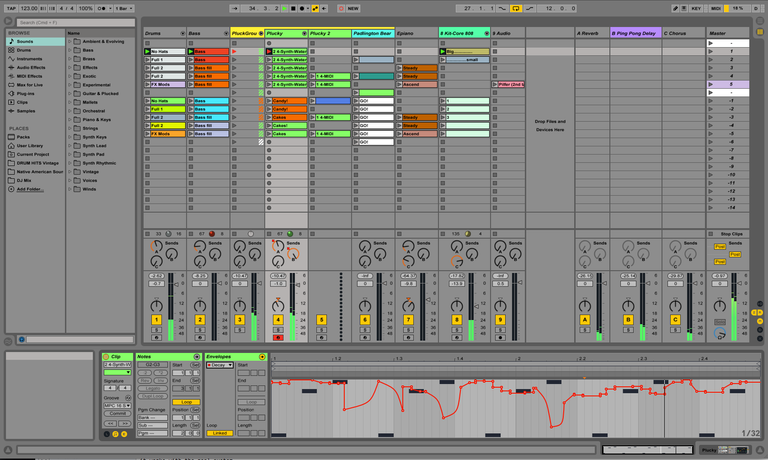
I love being able to organize music idea into loops. Live has both a session view, arranged like a mixer with stacks of loops on top, and a timeline view (Arrangement View). You can launch these sections of loops to quantize to the beat, bar, or really any subdivision of time. This is huge if you are feeling stuck and don't know how to arrange the sections yo've come up with thus far. Change the quantization to 8th notes and hit record. Then mix up up your sections and have them play unexpectedly.
If you want to introduce more randomness, you can set clips on the same track to alternate at various times, or stop completely after a number of loops.
2.) Flat, Beautiful Interface
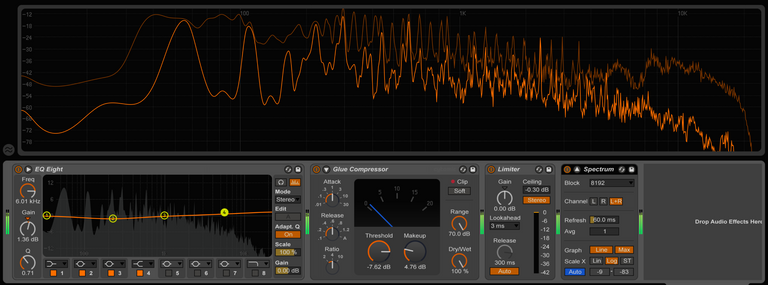
I'm not a fan of all the different visual presentation and GUI that comes with most DAWs and plugins. I find it distracting and cumbersome honestly. I just want attributes and easy way to control them. Having a compressor look vintage is not going to improve the sound quality or your creativity. Less is always more. The uniformity across the audio effects, instruments, and midi controls create a familiar environment that makes it easier to create with the built in tools. I don't use any plugins because the built in instruments and effects are incredible (except for Pianoteq once in a while, because it's best piano sound I've ever heard emulated and takes up almost no CPU). The more you learn about how the tools work, the more in translates across the whole DAW.
And you can change the color scheme really easily. It's kind of like the Apple of DAWs. I will note that Logic X UI has improved greatly also. Much smoother.
3.) Proprietary Warping & Time Stretching
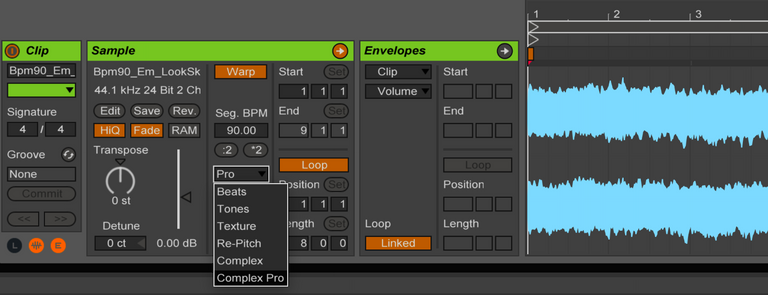
The various modes in Ableton for warping audio and loops are both utilitarian and an instrument in their own right. Beat-based warping creates staggering glitchy rhythms you wouldn't have made without. Textural warping introduces grain-base time stretching for creating huge and dynamic atmospheric sounds. Use Tone based warping for fixing timing without losing the tonal quality of the sound, excellent for clearly pitched instruments or vocals. There's a ton of capability here.
4.) World Class Instruments & Synths

Ableton has some incredible instruments, many of them created with AAS, the world leader in acoustics and sound modeling. Take Tension for example. It's string based modeling instrument that allows you create sounds that very accurately emulate real-life instruments, or create hybrid sounds that could be physical but you would have no way to make in reality (yet). Collision, Sampler, Operator (best FM synthesizer I've used), Analog, not too mention sample libraries galore, layer-able instrument racks and drum racks... really some of the best synths and emulators I've laid my hands on.
5.) Build Custom Instruments, Effects, and Visuals with Max
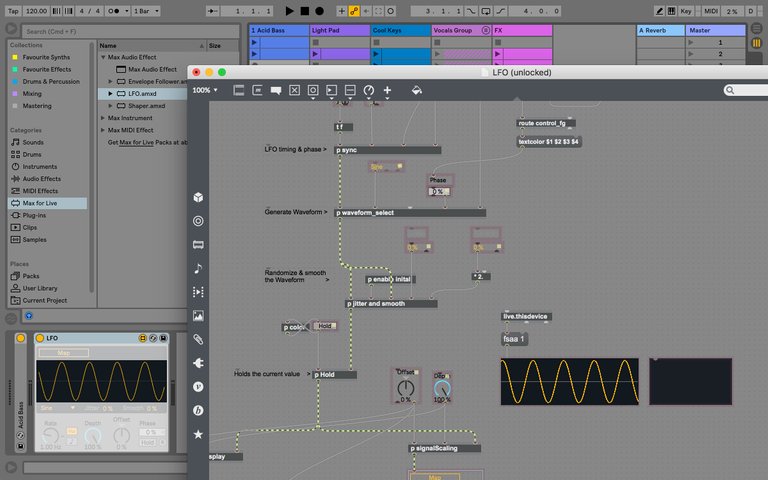
This can be a completely separate post, or book even, on what you can do with Max for Live. I'll just let Ableton's website speak for itself:
Max for Live is a platform to build your own instruments and effects, tools for live performance and visuals, and much more. You can open up any of Live’s Max devices, see how they’re built, and change them to meet your needs. You can build your own from scratch using the same components. And you can even use Max to change the way Live works, including the properties of tracks, clips and scenes.
So, I might be a bit biased. ;-)
This is just my humble experience and I am no one of note. Please take it with a grain of salt. Get some demos. Play around with you have access to, and if you like it, learn it inside and out. Then concentrate more on creating beautiful things and less on beautiful tools.
If you have any questions about Ableton Live, ask away in the comments and I'd be happy to give some feedback.
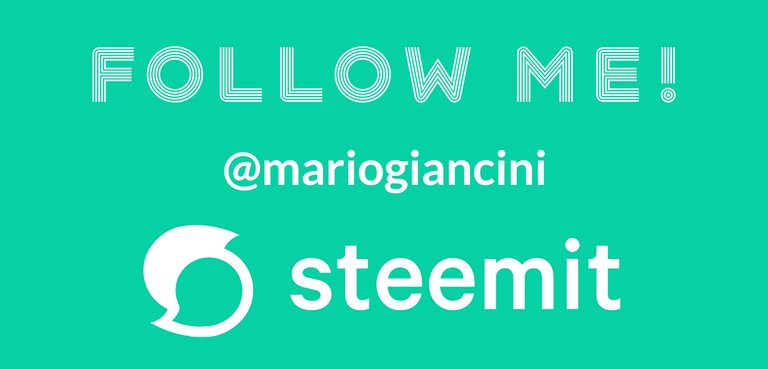
Even If I don´t use Ableton so often (but sometimes, when the mood takes me :-)) I like your post. It´s a good guide/intro for everybody, who is still searching for his/her ideal DAW. And Ableton is - of course - a very good choice! And I liked reading your opinion like "the best DAW is the DAW you know best". It simply says everything. Again: Thank you for your great artice/post. I will follow you and look forward to more of your work. Enjoy your life! Rolf from the Czech republic.
Thanks @roflim!
I really glad you enjoyed the post, and thanks for following. Followed back! :-)
This post has received a 6.25 % upvote from @sleeplesswhale thanks to: @mariogiancini.
This post has received a 8.55% upvote from thanks to: @mariogiancini.
thanks to: @mariogiancini.
For more information, click here!!!!
Send minimum 0.100 SBD to bid for votes.
Do you know, you can also earn daily passive income simply by delegating your Steem Power to @minnowhelper by clicking following links: 10SP, 100SP, 500SP, 1000SP or Another amount. (10 SP minimum)
@jerrybanfield thoughts? ;-)
You ready for 10?
You got a 11.16% upvote from @steembloggers courtesy of @mariogiancini!
Sneaky Ninja Attack! You have been defended with a 3.00% vote... I was summoned by @mariogiancini! I have done their bidding and now I will vanish...Whoosh
I use live as well since getting version of Live lite when I bought a guitar interface (M-Audio) many years ago. I've put a lot of time into learning and experimenting but realised I'm better off practising my instrument and learning more music and experimenting.
I'll never be a top producer but it's nice knowing enough to be able to experiment and basically be a one-man-band. I get my tracks finished off in a studio with a producer who uses Pro tools so when bouncing my tracks and importing them it can be a bit or extra work.
My producer tells me that Pro tools is better for musicians because live is more suited to EDM producers and DJs. Also on the guitar forums they say that Reaper is the way to go. If I was starting out again and looking for the best DAW for a guitarist/composer I might have gone a different direction.
But I looked at the free version of Pro tools, was about to download it then thought about the time/effort it would take to learn it and thought....naaah - that ain't happenin'...
I'm happy with Live which is more than sufficient for all my musician needs and I like a bit of EDM and playing with synths so it's all good. I'll probably upgrade to 10 even if it means I'm still only using about 10% of what it's capable of :) This is what my setup looks like:
![20170412_193622.jpg]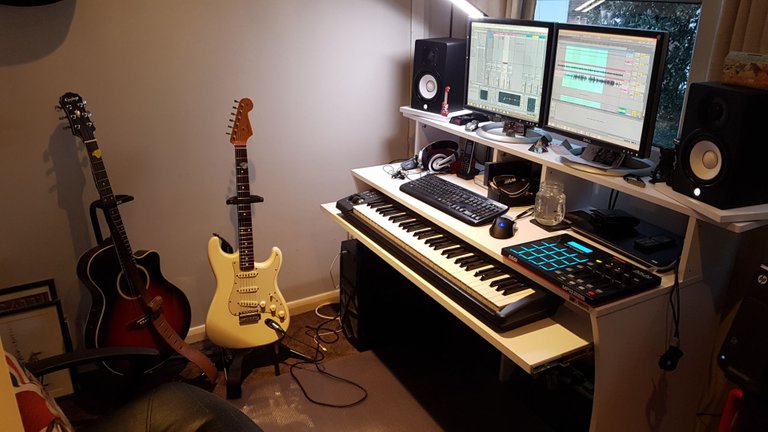 )
)
(
Now I'm going to get back to my jazz theory tutorials...
Thanks for the input @ddhf.
Yeah, some producers will tell you that it's just for EDM and DJing, but I feel like thats a very limited and shallow view of what Ableton is. It definitely lends itself towards those genres, but if you want to do more than just record your guitar or other outboard instruments, Ableton's instruments have so much to offer. And the abilities you have with writing by utilizing the Session view , breaking down songs into non-linear parts, it's priceless for your creative process.
And the new features with Live 10 are fantastic.
Which instruments do you find yourself using the most? Apparently the stock synths within Ableton are quite the hidden gems.
They really are @jthorn! I've used Operator the most out all of them, but each are very powerful. Combining them, or sampling a sound from one and then using it in Sampler creates some very unique sounds.
I just gotLive 10 and have been messing with the new Wavetable synth. I'm blown away.